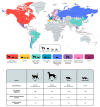Current State of Knowledge about Role of Pets in Zoonotic Transmission of SARS-CoV-2
- PMID: 34208484
- PMCID: PMC8234912
- DOI: 10.3390/v13061149
Current State of Knowledge about Role of Pets in Zoonotic Transmission of SARS-CoV-2
Abstract
Pets play a crucial role in the development of human feelings, social life, and care. However, in the era of the prevailing global pandemic of COVID-19 disease caused by the severe acute respiratory syndrome coronavirus 2 (SARS-CoV-2), many questions addressing the routes of the virus spread and transmission to humans are dramatically emerging. Although cases of SARS-CoV-2 infection have been found in pets including dogs, cats, and ferrets, to date there is no strong evidence for pet-to-human transmission or sustained pet-to-pet transmission of SARS-CoV-2. However, an increasing number of studies reporting detection of SARS-CoV-2 in farmed minks raises suspicion of potential viral transmission from these animals to humans. Furthermore, due to the high susceptibility of cats, ferrets, minks and hamsters to COVID-19 infection under natural and/or experimental conditions, these animals have been extensively explored as animal models to study the SARS-CoV-2 pathogenesis and transmission. In this review, we present the latest reports focusing on SARS-CoV-2 detection, isolation, and characterization in pets. Moreover, based on the current literature, we document studies aiming to broaden the knowledge about pathogenicity and transmissibility of SARS-CoV-2, and the development of viral therapeutics, drugs and vaccines. Lastly, considering the high rate of SARS-CoV-2 evolution and replication, we also suggest routes of protection against the virus.
Keywords: COVID-19; SARS-CoV-2; pets suitable animal models; zoonotic potential.
Conflict of interest statement
The authors declare no conflict of interest.
Figures

References
-
- John Hopkins Coronavirus Resource Center [(accessed on 20 May 2021)]; Available online: https://coronavirus.jhu.edu/map.html.
-
- Morgan L., Protopopova A., Birkler R.I.D., Itin-Schwartz B., Sutton G.A., Gamliel A., Yakobson B., Raz T. Human-dog relationships during the COVID-19 pandemic: Booming dog adoption during social isolation. Humanit. Soc. Sci. Commun. 2020;7:155. doi: 10.1057/s41599-020-00649-x. - DOI
-
- Statista How Has Your Pet Ownership Been Affected by COVID-19? [(accessed on 17 November 2020)]; Available online: https://www.statista.com/statistics/1191395/pet-ownership-status-due-to-...
-
- Wyborcza.pl Jasna Strona Pandemii. Coraz Mniej Zwierząt w Schroniskach, a Więcej w Domach. [(accessed on 14 April 2021)]; Available online: https://trojmiasto.wyborcza.pl/trojmiasto/7,35612,26973696,mniej-czworon....
Publication types
MeSH terms
Grants and funding
LinkOut - more resources
Full Text Sources
Medical
Miscellaneous

